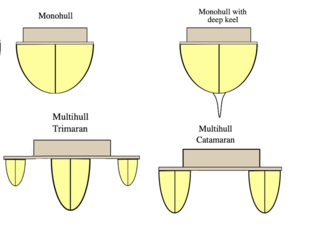
A multihull is a boat or ship with more than one hull, whereas a vessel with a single hull is a monohull. The most common multihulls are catamarans, and trimarans. There are other types, with four or more hulls, but such examples are very rare and tend to be specialised for particular functions.

A catamaran is a watercraft with two parallel hulls of equal size. The distance between a catamaran's hulls imparts resistance to rolling and overturning. Catamarans typically have less hull volume, smaller displacement, and shallower draft (draught) than monohulls of comparable length. The two hulls combined also often have a smaller hydrodynamic resistance than comparable monohulls, requiring less propulsive power from either sails or motors. The catamaran's wider stance on the water can reduce both heeling and wave-induced motion, as compared with a monohull, and can give reduced wakes.
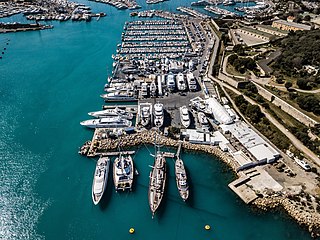
A shipyard, also called a dockyard or boatyard, is a place where ships are built and repaired. These can be yachts, military vessels, cruise liners or other cargo or passenger ships. Compared to shipyards, which are sometimes more involved with original construction, dockyards are sometimes more linked with maintenance and basing activities. The terms are routinely used interchangeably, in part because the evolution of dockyards and shipyards has often caused them to change or merge roles.

A trimaran is a multihull boat that comprises a main hull and two smaller outrigger hulls which are attached to the main hull with lateral beams. Most modern trimarans are sailing yachts designed for recreation or racing; others are ferries or warships. They originated from the traditional double-outrigger hulls of the Austronesian cultures of Maritime Southeast Asia; particularly in the Philippines and Eastern Indonesia, where it remains the dominant hull design of traditional fishing boats. Double-outriggers are derived from the older catamaran and single-outrigger boat designs.

An inflatable boat is a lightweight boat constructed with its sides and bow made of flexible tubes containing pressurised gas. For smaller boats, the floor and hull are often flexible, while for boats longer than 3 metres (9.8 ft), the floor typically consists of three to five rigid plywood or aluminium sheets fixed between the tubes, but not joined rigidly together. Often the transom is rigid, providing a location and structure for mounting an outboard motor.
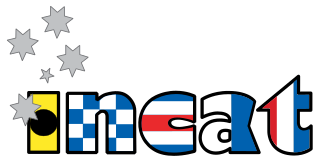
Incat Tasmania is an Australian manufacturer of high-speed craft (HSC) catamaran ferries. Its greatest success has been with large, sea going passenger and vehicle ferries, but it has also built military transports and since 2015 it has built smaller river and bay ferries. Based in Derwent Park, a suburb of Hobart, Tasmania, Australia, it was founded by Bob Clifford.

Nathanael Greene Herreshoff was an American naval architect, mechanical engineer, and yacht design innovator. He produced a succession of undefeated America's Cup defenders between 1893 and 1920.

The Sea Tigers was the naval wing of the Liberation Tigers of Tamil Eelam during the Sri Lankan Civil War. It was founded in 1984. The Sea Tigers had a number of small but effective suicide bomber vessels. During its existence it had gained a reputation as a capable adversary for the Sri Lankan Navy. During the civil war, the Sea Tigers had sunk at least 29 Sri Lankan small inshore patrol boats, 20 Dvora Class fast attack craft, 3 gunboats, 2 Large surveillance command ships, and one freighter.

The economy of Kerala is the 9th largest in India, with an annual gross state product (GSP) of ₹9.78 lakh crore in 2020–2021. Per-capita GSP of Kerala during the same period is ₹257,711 (US$3,200), the sixth largest in India. In 2019–20, the tertiary sector contributed around 63% of the state's GSVA, compared to 28% by secondary sector, and 8% by primary sector.
HMT Limited, formerly Hindustan Machine Tools Limited, is an Indian state-owned manufacturing company under the control of the Ministry of Heavy Industries, Government of India. It was founded in 1953 as a machine tool manufacturing company, diversifying into watches, tractors, printing machinery, metal forming presses, die casting and plastic processing machinery, and CNC systems and bearings. HMT is headquartered at Bangalore.

Chinkara Motors, officially Chinkara Motors PVT Ltd, was a Mumbai, Maharashtra-based auto, marine, ATV and aviation manufacturer. Chinkara operated from 2003 to 2016.
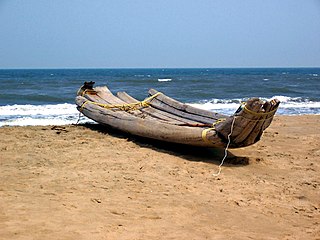
Kattumaram (கட்டுமரம்) is a traditional Tamil watercraft used in the Coast of Southern India, Sri Lanka, and Bangladesh. They are characterized by being made from three to seven tree trunks tied together with fiber lashings and/or treenails. The lashings are not permanent and the individual tree trunks are commonly separated to dry under the sun when kattumaram are beached. Most kattumaram are rafts because they are not watertight and rely on the buoyancy of the individual logs. However, some types of kattumaram known as teppa are watertight due to the addition polystyrene fillings on the hull and thus are true boats. They are propelled by oars, paddles, or lateen or lug sails. Modern versions of the kattumaram made from fibreglass are known as "fibre-teppa".
Intermarine is an Italian shipbuilding company, owned by the Rodriquez Cantieri Navali Group.
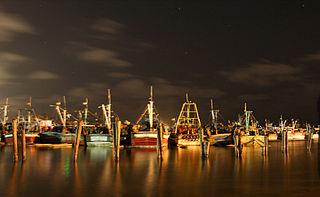
Royapuram fishing harbour, also known as Chennai fishing harbour or Kasimedu fishing harbour, is one of the major fishing grounds for catching fishes and crustaceans located at Kasimedu in the Royapuram area of Chennai, India. The harbour is located north of the Chennai Port and is under the administrative control of the Chennai Port Trust. The harbour is also a shipbuilding facility, chiefly building fishing boats. The nearest railway station is the Royapuram Railway Station.

The Makar-class survey catamarans are a series of six 500 ton steel hull/aluminium superstructure Hydrographic Survey Catamarans being built by Alcock Ashdown (Gujarat) Ltd at its Bhavnagar shipyard for the Indian Navy. The ships are designed by an Australian naval architecture firm Sea Transport Solutions, which is based on Queensland's Gold Coast. The deal was canceled due to the extensive delays as the Navy was not satisfied with the timeline and a fresh award for construction of another class of survey vessels to the GRSE has also been undertaken.
Bristol Boats is an Indian fiberglass boat manufacturer and marine engineering service provider. It is located in the backwaters of Cochin at Aroor Industrial Development Area, Allappuzha District, Kerala. It is a division of M/s Chika Private Limited headquartered at Mumbai.
Vadyar Boats Pvt. Ltd. is a Chennai based boat manufacturer and marine service provider.

Richardson Devine Marine is an Australian company, situated in Tasmania on Hobart's Derwent River.

The GC32 is a class of hydrofoiling catamaran, 32 feet in length and constructed of carbon fibre, with a top speed of about 40 knots. They are sailed in the GC32 Racing Tour, and have replaced the Extreme 40's in the Extreme Sailing Series.

The Minisail is a 13-foot single-handed dinghy which was designed by Ian Proctor in 1959 and became popular in the 1960s. It was the predecessor to the Topper and was the first British production boat to popularise the idea of the "sailing surfboard". As the Topper gained popularity in the 1980s, the Minisail disappeared from the scene. However, on 28 August 2011, a group of enthusiasts restarted the Minisail Class Association, which now has a small but committed following mainly in north-west Europe. The class association website is https://www.minisail.org.uk/















